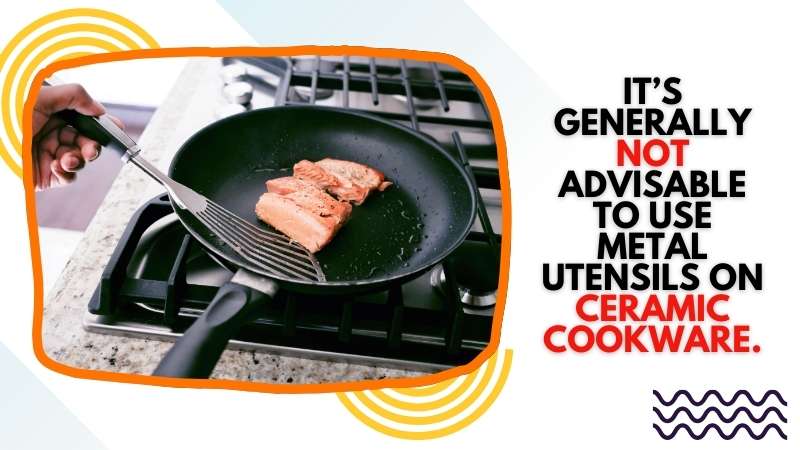No, it’s generally not advisable to use metal utensils on ceramic cookware.
In my experience, I once used a metal spatula on a ceramic frying pan, thinking it wouldn’t make much of a difference. However, after a few uses, I noticed small scratches on the surface. These scratches not only made cooking more difficult but also made cleaning the pan harder. Since then, I’ve switched to using wooden or silicone utensils exclusively with ceramic cookware. This change has helped maintain the quality of the cookware for a longer period.

Understanding Ceramic Cookware
Using metal utensils on ceramic cookware can scratch or chip the non-stick ceramic coating, which is essential for the cookware’s performance and longevity. Ceramic is a durable but somewhat delicate material when it comes to direct contact with hard metals. Over time, even light scratching can compromise the surface, reducing its non-stick properties and potentially leading to the leaching of materials into your food.
Advantages of Ceramic Cookware:
- Nonstick Surface: Ceramic coatings provide a naturally nonstick surface, reducing the need for excessive oil.
- Aesthetic Appeal: Available in various colors and designs, ceramic cookware adds a stylish touch to your kitchen.
- Even Heating: Ceramic cookware distributes heat evenly, preventing hot spots that can burn food.
- Chemical-Free: Ceramic is free from harmful chemicals such as PFOA and PTFE, making it a safer choice for cooking.
Impact of Metal Utensils on Ceramic Cookware
Using metal utensils on ceramic cookware can be problematic. While the ceramic coating is designed to be durable, it is still susceptible to damage from sharp or abrasive objects like metal utensils.
Potential Damage
1. Scratches and Chips:
- Metal utensils can cause scratches on the ceramic surface. Once the surface is scratched, it loses its nonstick properties, making cooking and cleaning more challenging.
- Chipping can also occur if the utensil is used forcefully or if the cookware is dropped. Chips can lead to uneven cooking surfaces and can compromise the integrity of the cookware.
2. Reduced Lifespan:
- Consistent use of metal utensils can significantly reduce the lifespan of your ceramic cookware. Scratches and chips weaken the coating, leading to early wear and tear.
3. Health Concerns:
- Damaged ceramic coatings can potentially release harmful particles into your food, posing health risks. While ceramic is generally safe, it’s best to avoid using it once the coating is compromised.
| Type of Damage | Description | Impact on Cookware |
|---|---|---|
| Scratches | Fine lines caused by sharp metal edges | Reduces nonstick efficiency |
| Chips | Pieces of the ceramic coating break off | Leads to uneven cooking |
| Wear and Tear | Gradual degradation of the ceramic surface | Shortens cookware lifespan |
Alternatives to Metal Utensils
To preserve the integrity of your ceramic cookware, it’s essential to use utensils made from materials that are gentler on the ceramic surface. Here are some of the best alternatives:
1. Wooden Utensils:
- Wooden utensils are smooth and gentle, making them an excellent choice for ceramic cookware. They won’t scratch or chip the surface, and they are durable and long-lasting.
2. Silicone Utensils:
- Silicone utensils are flexible and heat-resistant, making them ideal for cooking with ceramic cookware. They are non-abrasive and won’t damage the ceramic surface.
3. Nylon Utensils:
- Nylon utensils are another safe option for ceramic cookware. They are strong enough for cooking but soft enough to avoid scratching the ceramic surface.
| Material | Durability | Heat Resistance | Impact on Ceramic Surface |
|---|---|---|---|
| Metal | High | High | High risk of damage |
| Wood | Medium | Medium | Gentle on ceramic |
| Silicone | High | High | Safe for ceramic |
| Nylon | Medium | Medium | Safe for ceramic |
Best Practices for Maintaining Ceramic Cookware
Ceramic cookware is known for its nonstick properties, even heating, and attractive appearance. However, to keep it in prime condition, proper maintenance is essential. Here are some best practices that will help you extend the life of your ceramic cookware:
1. Use Appropriate Utensils
- Why It Matters: Metal utensils can easily scratch or chip the ceramic coating, leading to a compromised nonstick surface and shorter lifespan.
- Recommended Utensils: Opt for utensils made from wood, silicone, or nylon. These materials are gentle on the ceramic surface and won’t cause damage during cooking.
2. Avoid High Heat
- Why It Matters: Ceramic cookware is designed for low to medium heat. Using it at high temperatures can cause the ceramic coating to crack, warp, or lose its nonstick properties.
- How to Practice: Always start cooking on low heat and gradually increase it if needed. Avoid using the highest settings on your stove, especially if you’re cooking without much liquid in the pan.
3. Proper Cleaning
- Why It Matters: Abrasive cleaning tools and harsh detergents can wear down the ceramic coating over time, reducing its effectiveness.
- Cleaning Tips:
- Allow the cookware to cool completely before washing to prevent thermal shock, which can cause cracks.
- Use warm, soapy water and a soft sponge or cloth to clean the surface.
- Avoid scouring pads, steel wool, or any abrasive cleaners.
- For stubborn food residues, soak the cookware in warm water before gently scrubbing.
4. Storage
- Why It Matters: Stacking ceramic cookware without proper protection can lead to scratches and chips on the surface.
- How to Store:
- Store pots and pans separately if possible.
- If you need to stack them, place a soft cloth, paper towel, or pan protector between each piece to prevent direct contact and potential damage.
5. Seasoning Your Cookware
- Why It Matters: Some ceramic cookware benefits from occasional seasoning, which can help maintain its nonstick properties.
- How to Season:
- Lightly coat the surface with cooking oil, such as vegetable or olive oil.
- Heat the cookware on low to medium heat for a few minutes.
- Allow it to cool, then wipe off any excess oil with a paper towel.
- This process can enhance the nonstick surface and protect the coating.
6. Avoid Sudden Temperature Changes
- Why It Matters: Rapid changes in temperature can cause ceramic cookware to crack or warp.
- How to Practice:
- Avoid moving the cookware directly from the stove to cold water or vice versa.
- Let the cookware cool down gradually before washing or storing it.
7. Limit Use of Nonstick Sprays
- Why It Matters: Nonstick sprays can build up on the ceramic surface over time, creating a sticky residue that’s difficult to remove.
- Alternative: If you need to enhance the nonstick surface, use a small amount of oil or butter instead of nonstick sprays.
| Best Practice | Why It Matters | How to Implement |
|---|---|---|
| Use Appropriate Utensils | Prevents scratches and chips | Use wood, silicone, or nylon utensils |
| Avoid High Heat | Prevents cracking and warping | Cook on low to medium heat |
| Proper Cleaning | Maintains nonstick properties | Use warm soapy water and a soft sponge |
| Storage | Prevents scratches and chips | Use cloth or paper towels between pieces |
| Seasoning | Enhances nonstick properties | Coat with oil and heat occasionally |
| Avoid Sudden Temperature Changes | Prevents cracking and warping | Allow cookware to cool gradually |
| Limit Use of Nonstick Sprays | Avoids sticky residue | Use oil or butter instead |
What Happens if I Accidentally Use Metal on Ceramic Cookware?
If you accidentally use metal utensils on ceramic cookware, you may notice minor scratches or marks on the surface. These scratches can weaken the coating, reducing its non-stick properties and potentially causing food to stick. Over time, repeated use of metal utensils can lead to significant damage, making the cookware less effective.
Are There Alternatives to Metal Utensils for Ceramic Cookware?
Yes, you should use non-metallic utensils such as those made from wood, silicone, or plastic. These materials are gentle on the ceramic surface and won’t cause scratches. Wooden spoons, silicone spatulas, and plastic ladles are all great options that can help extend the life of your ceramic cookware.
Will Scratches from Metal Utensils Affect the Safety of Ceramic Cookware?
While minor scratches from metal utensils won’t immediately make ceramic cookware unsafe, they can contribute to the degradation of the non-stick surface. Over time, this can lead to food particles sticking to the surface, making it harder to clean. If the coating becomes significantly worn, it’s best to replace the cookware to ensure safe and effective cooking.
How Can I Prevent Damage to Ceramic Cookware?
To prevent damage, avoid using metal utensils and instead opt for utensils made from softer materials like wood, silicone, or plastic. Additionally, handle the cookware gently and avoid using abrasive cleaning tools. When storing, place a soft cloth or paper towel between stacked cookware to prevent scratches.
Can I Repair Scratches on Ceramic Cookware?
Unfortunately, once ceramic cookware is scratched, it’s difficult to repair. The best course of action is to prevent scratches by using the proper utensils and taking care when cleaning and storing the cookware. If the scratches are minor, the cookware may still be usable, but if the coating is significantly damaged, it’s better to replace the cookware.
How Long Will Ceramic Cookware Last if I Use Metal Utensils?
If you frequently use metal utensils on ceramic cookware, the lifespan of the cookware will be significantly shortened. The non-stick coating may begin to degrade within a few months to a year, depending on the frequency of use. To maximize the lifespan of your ceramic cookware, avoid using metal utensils and take proper care of the cookware.
What Are the Best Practices for Cleaning Ceramic Cookware?
When cleaning ceramic cookware, avoid using abrasive sponges or scouring pads, as they can scratch the surface. Instead, use a soft sponge or cloth with mild dish soap. For stubborn stains, soak the cookware in warm soapy water before gently scrubbing. Always allow the cookware to cool down before cleaning to prevent thermal shock, which can also damage the ceramic coating.
Final Thought
Ceramic cookware is an excellent choice for healthy and stylish cooking, but it requires proper care to maintain its nonstick properties and extend its lifespan. Using metal utensils on ceramic cookware can lead to scratches, chips, and overall degradation of the cookware, which not only diminishes its effectiveness but can also pose health risks.
To protect your investment, it’s crucial to use utensils made from safer materials such as wood, silicone, or nylon. Additionally, following best practices such as cooking on lower heats, cleaning with non-abrasive tools, and proper storage will help preserve your ceramic cookware for years to come.
Remember, while ceramic cookware is durable, it’s not invincible. With the right care and attention, you can enjoy the benefits of ceramic cooking without the worry of damaging your kitchen essentials.

I may be a little “crazy” when it comes to cooking, but I enjoy every minute of it. Spending time in the kitchen itself, whether with my family or my friends, brings me both happiness and exhilaration. This blog was created to showcase my cooking/eating with family and friends. And also as an opportunity to discuss ideas on food and the culinary circle in general.




